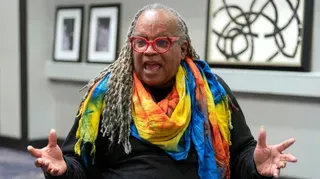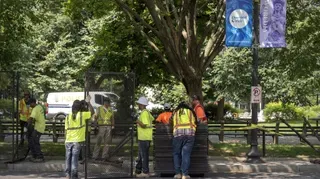May 28, 2013
NY Mayoral Hopeful Would Be a First, in 2 Ways
Jason St. Amand READ TIME: 6 MIN.
It was an unscripted moment made for Christine Quinn.
One of her Democratic rivals in the New York City mayor's race had tried a bit of wry gallantry after both started answering a candidate-forum question at the same time.
"Ladies first," John Liu said. It was a National Organization for Women event, after all, and Quinn was the only woman on the stage.
"Who are you calling a lady?" she wisecracked back, to laughs from the crowd. "But I'll take the opportunity."
Take opportunity? It could be said that Quinn stands to redefine it. Currently the front-running Democrat in the race, she would be both the first woman and the first openly gay person to lead the nation's biggest city.
Ebullient and seemingly inexhaustible, with an intensity tempered by a ready laugh that can be heard from down the hall, the red-headed Quinn is the kind of person who can describe herself as a "pushy broad" and not make you wince.
At the same time, Quinn is a veteran, work-through-the-system city council chief who champions consensus and compromise. When she faces criticism, the knock is she's too pragmatic as often as too pushy.
"To get things done, you have to get people together," Quinn said in an interview Friday. But "consensus doesn't happen by magic. ...You have to drive to it."
"And to get those kinds of results in this town, you need to be tough."
___
The speaker of the 51-member City Council, Quinn has some significant advantages in an up-for-grabs mayor's race.
She's polling ahead of other Democratic contenders in a heavily Democratic city, though the gap has narrowed in recent months. The dynamic became even more fluid when Democratic former Rep. Anthony Weiner got into the race last week.
Quinn leads in fundraising with more than $7.1 million, and her job enables her to point to diverse accomplishments including compelling repairs to dilapidated apartment buildings, negotiating in budget talks and preserving teachers' jobs.
Political observers have long seen Quinn as a centrist, at least for left-leaning New York: a leader with liberal roots who's open to business viewpoints and understands when governing means finding common ground. She's "able to find the median voter and represent the median voter," whether in her Manhattan district or among council members, retired Hunter College political scientist Kenneth Sherrill said.
And for better or worse, she has worked closely with current Mayor Michael Bloomberg.
It's long been thought Bloomberg is likely to back Quinn. Powerful business interests that like Bloomberg also respect Quinn for working with him.
But Bloomberg may also be Quinn's biggest liability. Her foes strive to paint her as too tight with a billionaire mayor who presided over a growing gulf between the city's rich and poor and got term limits changed, with Quinn's backing, so he could run again.
Partly because of her ties to Bloomberg, a well-financed PAC has sprouted up to oppose Quinn. The group, with backers including a city government workers' union, has amassed more than $1 million and aired ads attacking Quinn on term limits and other matters.
"What we see is a sellout," says Arthur Cheliotes, the president of the union, Communication Workers of America Local 1180, which has endorsed Liu.
Quinn says she's not afraid to oppose the mayor - or not.
"Our job isn't to stand at loggerheads with each other and think compromise is a bad word," she said earlier this year as the council prepared to override a Bloomberg veto.
It's perhaps a commentary on a changing society or Quinn herself that the groundbreaking aspects of her candidacy aren't front and center.
Not that Quinn, 46, strives to separate her personal and political life. She used to run a gay and lesbian advocacy group, she was a visible player in the push to legalize gay marriage in the state, and her 2012 wedding to her longtime partner, attorney Kim Catullo, was one of the biggest political parties of the year.
"I come as one package deal," Quinn said Friday. "An Irish lesbian who wakes up every day and goes to work. And I don't spend a lot of time thinking about being the first this or the first that because it would take up space in my brain."
But, she added, "it would be thrilling, obviously, to be able to have a woman and an openly LGBT person as the mayor of New York City."
She opened another window on her private life this month, revealing that she grappled with bulimia and alcoholism in her younger years, when her mother was dying of cancer.
While some observers saw the revelation as a political ploy, Quinn said her aim was to help people facing similar problems.
"It was not an easy thing to do," she said Friday, but "I'm very proud of what I've been able to come through."
Quinn grew up on Long Island, a daughter of an electrical engineer father and a social-worker mother who encouraged her interest in politics as a way to help others.
After graduating from Trinity College in Hartford, Conn., Quinn moved to New York and worked as a tenants' rights advocate. She then worked for Tom Duane, one of the first openly gay City Council members and later a state senator.
She later ran the NYC Anti-Violence Project, an organization that works to combat attacks on gay people and others, before winning her council seat in 1999. Her colleagues chose her as speaker in 2006.
Colleagues say she's a hands-on negotiator, and some give her plaudits for being willing to listen.
But others have said she wields her power with a retaliatory edge.
Democratic Councilman Peter Vallone Jr. notes that a city-funded scholarship program named for his father - a former council speaker - was cut in 2011 after the younger Vallone opposed Quinn on renaming the Queensboro Bridge for former Mayor Ed Koch. Quinn points to budget limitations, but Vallone says: "If you believe that all of that was a coincidence, then I have another bridge to rename."
Quinn has come under pressure on some high-profile issues this year.
Facing calls from civil rights and minority advocates to rein in the police practice known as stop and frisk, she agreed to back creating an inspector general for police, an idea Bloomberg and the city's popular police commissioner vigorously oppose.
She was also buffeted by political crosswinds over whether to require many employers to provide paid sick days, an idea blasted by business groups and Bloomberg but championed by unions and others including feminist standard-bearer Gloria Steinem. Steinem said she'd withdraw her support for Quinn's mayoral bid if she didn't allow a vote.
After three years of saying the time wasn't economically right, Quinn brokered some changes and got behind the measure.
Quinn says she has no qualms about balancing the competing interests and push-or-compromise tactics of her job.
"The answer to whether you hit the right the balance," she said, "is whether you get the right result."





